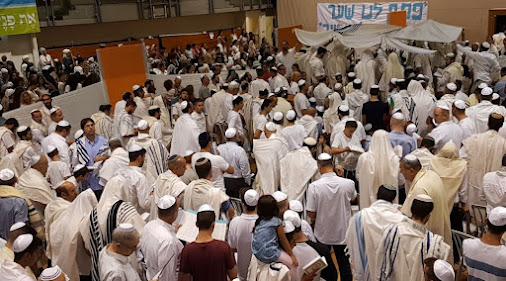Rosh Hashanah - Feast of Trumpets. Early Fall, sometimes very late summer
7th biblical month. The trumpets were considered a call to worship as well as a warning. From Elul 1, the month preceding Rosh Hashanah, up until Yom Kippur, these are called, the 40 days of Repentance. The last ten of those days, are called the (Ten) Days of Awe. During the Days of Awe, God is weighing and deciding if you will get another year of life.
The Trumpets are also supposed to herald the return of the Messiah, and his Coronation. Fall was also the season of the Fall of Adam, and so, the Creation story is also recounted during Rosh Hashanah.
It is thought that this 40 day time period (Elul's 30 days + 10 Days of Awe) corresponded to the Jesus' 40 days of fasting and prayer prior to the beginning of his ministry. After that fasting, he went into the synagogue and proclaimed the Jubilee! Luke 4: 16-21
p.s. the Jubilee is every 50 years and is part of the Israelite calendar.
******************************************************************
Yom Kippur - Day of Atonement Fall.
7th Biblical month. Yom Kippur, which falls in September or October, is a fasting holiday. The courts in heaven are decided on the fates; emphasis on groups, nations, and the world. Was there sufficient repentance to merit life and blessings? Or blessings being withdrawn, and possibly judgment, destruction or death?
During the Days of Awe, they repent, confess, make restitution as possible, ask for forgiveness as individuals and as a community, and fast and pray all day in the house of worship on Yom Kippur. They wear white, and have other prohibitions along with the fasting. Some go to the mikveh (ritual pool) and get immersed the day before.
It's interesting that some of the stock market crashes have been in October, because some markets operate from October to the following end of September.
The Biblical Flood was in the Eighth month (Cheshvan 17), after what would've been Yom Kippur & Sukkot. The people had rejected the last call for repentance. Might Noah and his family, with the animals, entered the ark during Sukkot, in the 7th month? Read next about Sukkot...
******************************************************************
Sukkot - The Feast of Tabernacles; {Sh'mini Atzeret and Simchat Torah.} Fall.
7th Biblical month. This is the third pilgrimage festival.
It's a 7 day festival shortly after Yom Kippur. It commemorates the time when the Israelites lived in temporary housing in the wilderness.
Modern day keepers of this holiday will build or put up a temporary hut or shelter (or maybe even a tent) and spend quite a bit of their personal time including sleeping and eating, in it. Some invite a guest to share a meal with them.
They will also waive the lulav and etrog every day (except Sabbath). The Lulav is a palm and willow branch set, and the etrog is a citrus that resembles the looks of a lemon. It all has symbolic meaning.
Sh'mini Atzaret is the 8th day, added on. Sometimes it is called the Great Last Day or Great and Last Day. Simchat Torah goes along with it, and it means Rejoicing in the Torah / Instruction. It has dancing around with the Torah Scrolls.
In John 7:37-39, during the end of the Feast of Tabernacles, Jesus pronounced himself as the Living waters of salvation, at the Feast's water libation ceremony.
Some people think that King Mosiah's speech in beginning of the book of Mosiah, was given at the Feast of Tabernacles.
Zechariah 14:16-17 This feast will still be celebrated in the Millennium, as commanded by the Lord.



No comments:
Post a Comment